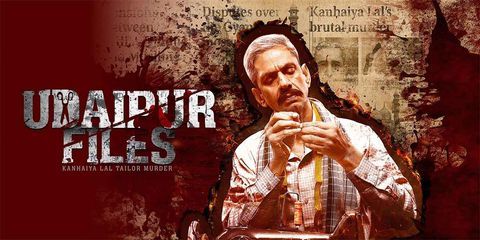Silence in Cinema, Relief for Radicals? Udaipur Files on Kanhaiya Lal’s Tragedy Fails with ₹1 Lakh Return
The Udaipur Files: Why Aren’t Indians Watching a Film Meant to Bring Justice to Kanhaiya Lal?

India, a country so passionate about social justice and outcry, is now witnessing a strange contradiction. In June 2022, the horrifying murder of Kanhaiya Lal, a tailor from Udaipur, Rajasthan, shook the entire nation. Two Muslim men brutally beheaded him, sparking nationwide anger, protests, and seemingly universal support for his grieving family. People flooded the streets, demanding justice and showing their solidarity.
Fast forward to August 2023, and the film “Udaipur Files,” based on Kanhaiya Lal’s murder, has been released. Unlike many commercial Bollywood movies, this film claims to authentically showcase the aspects of the crime that the common public might not know. What’s more, the creators announced that revenue generated from the film would be given to Kanhaiya Lal’s impoverished family—making it not just a movie, but a mission for justice.
Surprisingly, despite its noble intentions and the emotional weight it carries, hardly anyone is watching it. Released on 8th August across a massive 4,500 screens nationwide, “Udaipur Files” made just Rs 13 lakhs on its opening day—a shockingly low figure for any movie with such a striking real-life connection. On its second day, the numbers plummeted further to barely Rs 1 lakh. This is in stark contrast to last year when millions protested Kanhaiya Lal’s killing.
What explains the lack of audience participation? Some argue that public outrage tends to be fleeting, restricted to social media hashtags and street protests, rarely translating to real, sustained action. Others say it’s a reflection of societal hypocrisy: people are quick to show anger, but slow when it comes to concrete support.
Making matters worse, the film’s release encountered significant legal hurdles. Mohammad Javed, named as the eighth accused in the Kanhaiya Lal case, filed a petition in court to halt the movie’s release, arguing that its trailer and promotions might incite communal tension and hamper the ongoing trial. The release was consequently stalled for weeks, only moving forward after a lengthy legal battle. The censor board demanded as many as 55 cuts before finally granting the film clearance.

While the legal battle was tough, the bigger battle seems to be drawing audiences into cinema halls now. If audiences do not show up within a couple of days, the film is likely to be pulled from theatres as a flop. The tragedy is further compounded by witnesses’ accounts: In one emotional incident, Kanhaiya Lal’s own son reportedly broke down in tears during a screening when the scene depicting his father’s murder was shown—demonstrating how intensely the film can impact viewers.
Despite these real emotions on display, and the film’s attempt to make viewers confront uncomfortable truths, the expected crowds are simply not arriving. It leaves a troubling question: how will there ever be true justice or healing if even such powerful moments fail to mobilize the public?
In the end, the reality is sobering. Outrage, no matter how loud in the moment, risks fading quickly. If meaningful actions do not follow emotional protests—if a cause for justice cannot hold the public’s attention for more than a few days—then perhaps, as the narrator put it, evil wins once again.
What do you think keeps people away from causes after the initial outrage fades? Is India facing a crisis of public memory and genuine action? Let us know your thoughts in the comments, and stay tuned for more updates and explorations of issues that matter most to our society.
News
Rahul Gandhi Shares Video of Pet Dog, Criticizes Supreme Court’s Stray Dog Order, Ignites Public Debate
Rahul Gandhi Shares Video of Pet Dog, Criticizes Supreme Court’s Stray Dog Order, Ignites Public Debate Amid heated controversy surrounding…
Sh0ck in Tripura: Soldier Accused of Poisoning His Infant Daughter for Being a Girl
Shock in Tripura: Soldier Accused of Poisoning His Infant Daughter for Being a Girl In a chilling incident that has…
Kedarnath Yatra Suspended for 3 Days: Heavy Rainfall and Red Alert Force High Alert in Uttarakhand
Kedarnath Yatra Suspended for 3 Days: Heavy Rainfall and Red Alert Force High Alert in Uttarakhand Important notice for all…
Violent Clash Over Parking Erupts on Haryana-Rajasthan Border: Multiple Injured, Vehicles Torched, Heavy Police Deployment
Violent Clash Over Parking Erupts on Haryana-Rajasthan Border: Multiple Injured, Vehicles Torched, Heavy Police Deployment A violent altercation broke out…
A Heartbreaking Tale from Nagpur: Man Forced to Carry Wife’s Body Alone After Fatal Accident—A Question on Humanity
A Heartbreaking Tale from Nagpur: Man Forced to Carry Wife’s Body Alone After Fatal Accident—A Question on Humanity A deeply…
Horrific Crime in Delhi’s Narela: Two Minors Gang-Raped at Private Swimming Pool, Accused Arrested
Horrific Crime in Delhi’s Narela: Two Minors Gang-Raped at Private Swimming Pool, Accused Arrested In a deeply disturbing incident from…
End of content
No more pages to load





